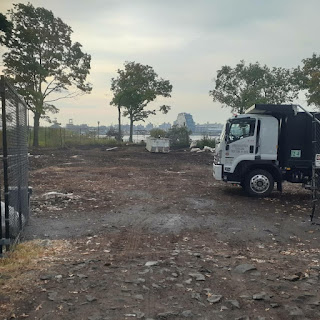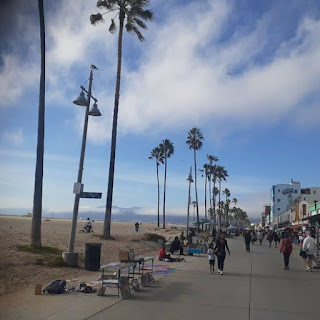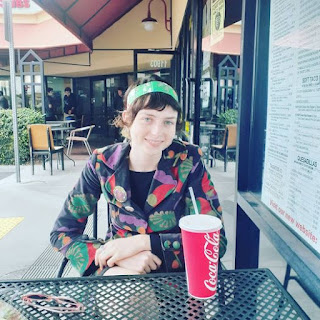Another beach day with my bicoastal bff... navigating school and life and music and bus routes throughout this urban geography. Sometimes at night it feels like an abandoned carnival she tells me.
“Come to the edge,' he said. 'We are afraid,' they said. 'Come to the edge, he said,' and slowly, reluctantly, they came. He pushed them and they flew.”
― Guillaume Appolinaire
On the flight to LA to see the teenager, I found a picture of Joey Ramone and Allen Ginsberg from 1992, two poetic New Yorkers. I recalled meeting Allen that Spring at USC. I told him how wonderful it was to hear him read. He told me how wonderful it was to have someone as cute as me appreciate seeing him. His words, my memories.
A lot had changed since then.
I’d spent the week in New York, jet lagged, from the trip to Brussels, reading poems with Eileen Miles and the other defenders of East River Park.
Some read Whitman, others their own poems.
Others recalled the biblical stories about trees, the ways we feel comfort under them, the way they guide us and give us shade and make cites feel livable, creating spaces for us to rest, for our lives to find meaning.
“We're fighting this with Poetry, Politically, and the Courts” says Eileen.
I read Allen Ginsberg’s “Tears” thinking about hte trees:
Back in Brooklyn, the youngster is out flyerring for the big East River Prak action on Halloween.
At UCLA, the teenager tells me about her favorite trees on campus, surrounding the outdoor swimming pool, where she swims every day, in a morning meditation.
It's a little like the Mohonk Mountain House or Joshua Tree, she tells me.
There have been three distinct chapters of my life when I spent time in Los Angeles:
in college at Pitzer when I met Allen G, when Dad worked in Long Beach in the late 1990’s, early 2000s, and then during my first teaching year, when Caroline, the teenager, her sister and I zig-zagged across the left coast for a year in between my classes.
This spring the teenager decided to give it a go at UCLA, and a new chapter started.
I found a cheap hotel in Santa Monica, where we’d meet the kid on Friday.
Or maybe we’d meet on campus or maybe somewhere else?
How about Taco Por Favor, said the teenager.
Ok, I'll meet you at the one in Santa Monica.
And off I walked.
It was 25 minutes away.
Phone rings.
Where are you?
I’m at the Taco Por Favor ordering tortilla soup.
Where are you?
I’m at the Taco Por Favor in Santa Monica.
So am I?
But I'm at the Taco Per Favor in Santa Monica by the skate park.
Whose on first?
Like the Starbucks, three of them at Astor Place, we’re all lost in the identical details here.
I was at the one in the strip mall in Santa Monica, by the strip club where the kids seem to be walking to and from after school.
She was at cool one.
And finally we worked it out.
There she was.
Greeting her, I felt like grandad, who used to laugh out loud in a warm greeting when he saw us, love pouring out of him.
And then he was gone.
We zipped off to Venice.
Walking past the homeless people selling their wares, the women in bikini’s riding bikes,
the skateboarders, past the disco skaters, down the thoroughfare.
At the skatepark, the teenager knows everyone.
She smiles.
Greets friends.
Skates, tells me where the people dance, where the kids hang, the drug dealers chat, the mom’s skate, runs into a buddy from college and keeps on skating.
The crisp sun fills the afternoon, as the kids do tricks.
A man shows up with a bird on his head.
He’s here every day, she tells me.
They tell me about the fight they saw their first weekend here, the people clashing and sharing the space, apologizing and negotiating what it all can mean.
Each day is another moment for street ethnography.
Public space for the people, everyone shares the bowl, trying not to crash rash into each other.
But sometimes it happens.
Afterwards, we hit the beach for more dancing, watching the water.
And then stroll through honkey tonk sundown, not unlike those in our old beloved Coney Island back home.
It comes down to Sushi or Mexican, she tells me on the way to dinner.
Over sushi, we chat about Dada and Audre Lorde and UCLA and intersectionality and on and on and on, the places she goes to play, the bus rides, frustrations and the ways she’s navigating it all.
“The regular people leave after sunset. Then the crazies arrive,” the teenager pauses, looking about, as people stroll past the otherwise empty beach.
“Its like an abandoned carnival,” she says. A few trans kids walk by, a few ladies in platform shoes, crusty punks.
“I think they are much better dressed then the UCLA kids,” she says.
Back at Santa Monica, we get a few snacks and watch Sunset Boulevard, well a little of it, before sleep.
I dreamed about dad the night before; had a vision of grandad's body in the casket in the viewing room in Thomasville, Ga, with Dad sitting nearby, and then of Dad dropping by, visiting us in my dream.
No one noticed or remembered he was dead.
He was just quiet, sitting there.
He always visited me, my whole life, every few months, always visiting, together away, together away, for years and years and years.
I”m trying to do the same for the teenager,
best friends separated by a coast.
The sun fills the sky on Saturday morning at Santa Monica pier; we are drinking coffee, looking at the homeless sleeping in the Palisades Park, listening to music, comparing favorite songs, folk punk the kids are listening to, chatting about it all, taking in the campy beach neighborhood. And the day opens, more Dada, more reflections, more art at UCLA, more beach, more paths crumbling as we walk North, more UCLA sweatshirts in Westwood, more protein burgers, more parents gushing at Parents weekend.
I am one of them.
I cried when I read about what happened to Appolinaire, she tells me, referring to the poet who died in the First World War, she’d been reading about for her Dada class.
Its hard finding a tribe, so she commutes with the women in the movement.
I am an absurdist, she tells me, dancing.
We take in the Witches Show at the Hammer, haunted images of bodies in time, spirits, shadows fall down.
“That's right I am a brother,” another man tells me on the bus to Sunset Boulevard.
A woman gets on the bus, screaming, knocking the windows, another day in paradise.
We’re off to Amoeba Records Hollywood where one of her friends works, the walk of fame takes us there.
Zillions of posters or records and hero's, and CD’s and pins and friends.
And then our feat lead us to Jet Rag on N La Brea Ave for more thrifting, the sun going down.
Its long walk, past shuttered hotels, where the homeless people seem to dwell, some squats, some crumbing, vines growing, nature reclaiming the strip mall.
The sun is going down, each block, something else, an encounter with homeless LA, goth LA, apocalyptic LA, cults here, passed out bodies there.
The Dodges are playing, projected in a parking lot outside some head shop, where people are selling pot.
How are you, I ask one of the hosts.
Living the dream, she tells me.
Finally, we get to Jones Hollywood.
It's an old LA haunt. I feel Jim Morrison’s presence here, drinking a sazerac, looking about, chatting with the teenager about her first time here with her friend, sharing a bowl of pasta and tomatoes. It feels like the ghosts of LA are with us, sitting in the shadows of the B movie like old haunt, technicolor blurring, Jim Bellushi arriving from Chateau Marmont, Darby Crash on the way to the Oaky Dog where he enjoyed a last supper.
We chat about the people, the dream, Laurel Canyon, and rock and roll, recalling our trips to New Orleans, our adventures then, the ones moving forward.
As we’re leaving, Rodney on the ROQ, the iconic DJ is coming.
His 1976 radio show changed it all.
Back at Santa Monica, we try to watch Sunset Boulevard.
But neither of us make it past the first few lines.
So we get up early.
Surfers are catching waves between Venice and Santa Moncia where we the next morning, talking about class and the week and growing up and navigating leaving home behind, and finding something else. But for a moment, its exquisite.
Enjoy the adventure.
Run toward it, instead of away, in between here and there, bicoastal, ideas, and feelings, divided loyalties between the left Coast and East Village, music here, parties there, trips to Paris ahead and old buddies behind.
The bus takes us to Melrose where we explore the Flea Market, digging through the old t shirts and artist wares and women in Dada books at Fairfax High School.
And off we go, our separate ways.
Goodbye for now.
See you soon friend.
Enjoy the carnival, the books, adieu.
I hate goodbyes.
Here and there.
Friends.
Appolinaire and company wrote a lot of love letters to each other, says the teenager.
Here’s to another hello for a weekend and another goodbye.
I’m back to Caroline and the little one whose been playing in the trees, going to shows all weekend long.
I get a cab to the airport, rushing to catch the flight after another long goodbye.
Back to New York and poems and books and unions and climate strikes; the teenager careens back to Westwood and books and Hollywood and parties, discovering new romping grounds, mixing new spaces connecting and separating, overlapping through time.
On the way home, I think of our families, of Dad leaving his Dad and Mom, and the day I left our family to fly West, our lives, ever connecting, and separating, the dislocations we force on ourselves, and Appolinaire, who “pushed them and they flew.”






































































































































































































































































































































No comments:
Post a Comment